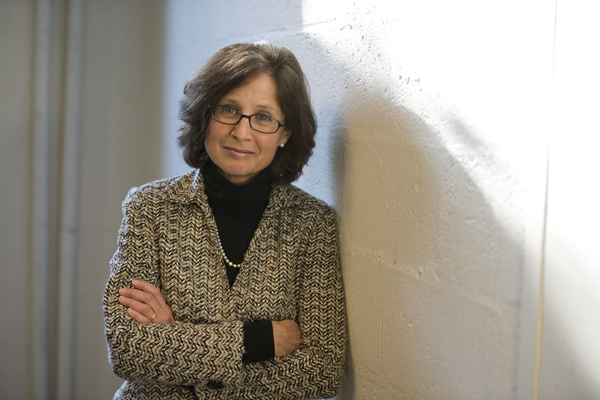Northeastern partners on Boston’s new Alzheimer’s initiative

Northeastern University associate professor of nursing Alice Bonner says that families are often the primary caregivers for people with Alzheimer’s disease and thus need more support and resources to effectively care for their loved ones. In particular, she said, cities like Boston can do more to advocate for these family members.
“There’s a huge problem with access to respite services in the city and very limited adult day health services,” said Bonner, a renowned expert whose research focuses on improving dementia care for people and families living with Alzheimer’s disease. “We’re not doing a good job taking care of our caregivers.”
To address this issue, the City of Boston recently announced a groundbreaking initiative to offer support services to those with Alzheimer’s and their families and raise awareness about the importance of early detection. Northeastern was named the city initiative’s first academic partner, thanks in large part to Bonner’s national leadership in this field. As a case in point, she participated in a stakeholder group the mayor convened in March 2013. Other initiative partners include the Alzheimer’s Association and Boston Medical Center.
An estimated 30,000 people across the city have loved ones with Alzheimer’s disease, including Boston Mayor Martin J. Walsh, who spearheaded the initiative. “Until you really go through it or a family member goes through it, people don’t fully understand the impacts on the family,” Walsh said Friday at a press conference announcing his initiative. He described his late grandmother living with Alzheimer’s and the exceptional care she received from her daughter Margaret, the mayor’s aunt.
A significant component of the mayor’s initiative is its partnership with the national Alzheimer’s Workplace Alliance, which is part of the Alzheimer’s Association. Boston and Northeastern are members of the alliance, which aims to ensure that employees of member organizations have both the education and resources they need to appropriately navigate the difficult journey of Alzheimer’s disease, both as patients and as caregivers.
The mayor’s initiative includes a program to recruit and train volunteers to provide free, much-needed respite services to caregivers across Boston. With an estimated 10,000 individuals living with Alzheimer’s in the city, these services will be invaluable, Boston Elderly Care Commissioner Emily Shea said in an interview.
Health professionals expect the number of people with Alzheimer’s to increase in the coming years as the average age of the world’s population continues to increase at an unprecedented rate. By 2025, the city will see an estimated 25 percent increase in the number of Alzheimer’s patients living in the city, and by the middle of the century the number will have increased threefold, according to Jim Wessler, CEO of the Alzheimer’s Association.
Bonner noted that Northeastern’s role in the mayor’s initiative would enable a wellspring of exciting opportunities across research, education, and service. Students will have the opportunity to work with the city and the Alzheimer’s Association to provide volunteer education and outreach services to caregivers across Boston. Long-term elderly care will also be an increased focus in the School of Nursing curriculum.
Northeastern’s work on the city’s initiative continues its increased focus on research related to Alzheimer’s disease and long-term elderly care under Bonner’s direction and the efforts align with Northeastern’s emphasis on use-inspired research in health, one of the university’s core research themes. This includes the Bouvé College of Health Sciences and its dean Terry Fulmer’s focus on bolstering research programs in the areas of healthy aging, chronic disease, and disability.
“When we train new nurses, many of them will work with older adults—that’s just the way the population is going,” Bonner said. “So, anyone working in primary care really needs a good understanding of care of people with dementia.” That is precisely what they will get at Northeastern.
“Having partners like the Alzheimer’s Association, like Northeastern, is really important to us to be able to get where we want to be,” Shea said. “With the training piece and with the respite volunteers there’s a lot of synergy between the City of Boston and Northeastern and what we want to accomplish.”





